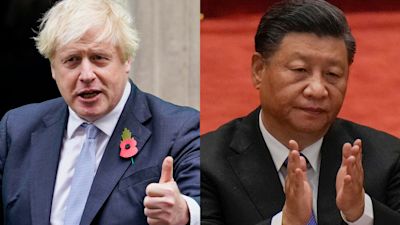Insight
Boris Johnson tells China’s President Xi to accelerate plans to reach peak carbon emissions

Boris Johnson on Friday said that his big hope for the COP26 negotiations that start on Monday is that the 197 participating governments, under the aegis of the United Nations, would agree a new more urgent schedule for drawing up plans to reduce greenhouse gas emissions – perhaps submitting what are known as nationally determined contributions every year, and certainly more regularly than the current five year timetable.
He conceded that there is no chance in the next fortnight of government’s putting in place commitments to reduce emissions by 55% before 2030, which would be required for there to be any certainty of restricting global warming to 1.5C above pre-industrial levels by 2050 – the increase regarded as relatively safe for the planet.
In a briefing to journalists on the plane to the summit of G20 leaders in Rome, the prime minister warned that if the battle against climate change was a football match, we would be at half time and losing by five goals to one.
As every football fan knows, victories are very rarely achieved against a four goal deficit.
"We are not going to stop global warming in Rome or in this meeting in COP," he said.
"The most we can hope to do is slow the increase… What we need to do is to take steps now that give us the ability in future to come back and make further commitments.
"Is there a way to accelerate the way the world engages in this faster that than the quinquennial [every five years] approach? The UK is very keen to look at that. It is a matter for the UN. It is a matter for the COP".
The COP27 climate conference - what you need to know
What is COP27? When and where will it be?
What is COP27? When and where will it be?
Each year, the United Nations Framework Convention on Climate Change (UNFCCC) meets at what is called the Conference of the Parties (abbreviated as COP) to discuss the world's progress on climate change and how to tackle it.
COP27 is the 27th United Nations Climate Change Conference of the Parties summit which will be held in Sharm El Sheikh, Egypt from November 6-18.
Who is going?
Who is going?
Leaders of the 197 countries that signed the United Nations Framework Convention on Climate Change (UNFCCC) - a treaty that came into force in 1994 - are invited to the summit.
These are some of the world leaders that will be attending COP27:
UK Prime Minister Rishi Sunak is attending the conference, after initially saying he wouldn't as he was too busy focusing on the economy within his first weeks in office.
US President Joe Biden and his experienced climate envoy, John Kerry, will appear at the talks.
France President Emmanuel Macron will also be among the heads of state from around the world staying in Egypt.
King Charles III will not be attending COP27, despite being a staunch advocate for the environment. The decision was made jointly by Buckingham Palace and former prime minister Liz Truss.
Elsewhere, Russian President Vladimir Putin and his Chinese counterpart Xi Jinping will not attend the talks just as they decided to do for COP26.
What is it hoping to achieve?
What is it hoping to achieve?
1. Ensure full implementation of the Paris Agreement and putting negotiations into concrete actions - included within this is the target of limiting global warming to well below 2C.
2. Cementing progress on the critical workstreams of mitigation, adaptation, finance and loss and damage, while stepping up finance notably to tackle the impacts of climate change.
3. Enhancing the delivery of the principles of transparency and accountability throughout the UN Climate Change process.
The prime minister added that it was appropriate world leaders are meeting in Rome, because the history of that great city showed that great civilisations could crumble – and he sees climate change as the gravest threat to our civilisation.
Johnson also disclosed that in a phone conversation with President Xi, this morning, he urged China’s leader to reach its peak of greenhouse gas emissions by 2025, rather than its planned target date of 2030.
"’25 would be better than 2030," Johnson said he communicated to Xi.
He also urged President Xi to exploit its technological prowess to reduce its dependence on coal: "The other point I was evangelical about again was the potential to move away from coal."
Johnson conceded that he received no indication from President Xi that he was persuaded by the British prime minister.